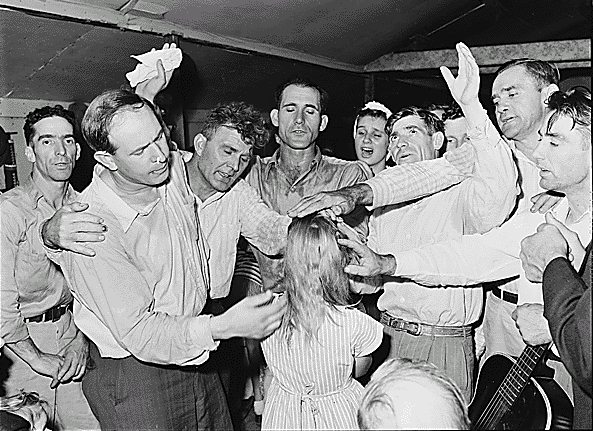John F. MacArthur is a well known fundamentalist
leader in California. He is the pastor of the Grace Community Church and
president of the Master's College, and the author of an extensive and popular
Bible commentary. Apparently, his theology combines Baptism, Calvinism and
Dispensationalism. Perhaps for that reason, his church is independent from the
major denominations.
"Charismatic Chaos" is John MacArthur's classical criticism of the charismatic movement, published in 1992. It's somewhat dated, since it was written before the onset of the Toronto Blessing, arguably the most extreme form of charismatic revival hitherto. Still, the book is often referenced by other critics of the charismatics, presumably because of its timeless Biblical arguments. It's also surprisingly well written and easy to read, something unusual for heavy works of theology and Bible exposition.
MacArthur argues that miracles, signs and wonders were unique to the age of the apostles and ceased already before the death of the last apostle. God no longer works through miracles and other supernatural occurrences, save for some exceptional circumstances. Charismatic claims of healing, raising the dead and other such miraculous events must therefore be considered bogus. Nor does God communicate through the speaking of tongues. That too was a unique occurrence during the apostolic age. Besides, the tongues miraculously spoken by some early Christians were real languages, not the gibberish typical of charismatic services. Further, MacArthur argues that the canon is closed, that no new revelation is possible today, and that the prophecies often made by charismatic leaders cannot be considered inspired or accurate. He also discusses the role of subjective experience, the ecumenical tendencies within the charismatic revival and rules for correct Bible interpretation. The harshest chapter deals with the Word of Faith movement, which the author believes is cultish, blasphemous and anti-Christian.
I consider MacArthur's book to be a very competent "traditional" answer to the charismatics, written from an evangelical/fundamentalist and somewhat Calvinist perspective (this book deals with Dispensationalism only in passing). People interested in the controversies sparked by the charismatic revival should definitely read this book. Indeed, it's probably the only fundamentalist response to the charismatics you need to read!
Of course, I don't believe a word of it. But then, I don't believe the charismatics either. As usual in debates of this sort, both sides frequently score points against each other. MacArthur is right to point out that the excesses of the charismatic movement were similar to those criticized by Paul in his first epistle to the Corinthians. He is (probably) wrong to suggest that "tongues" always referred to actual human languages. Paul mentions "the language of angels" in his epistle, something MacArthur unconvincingly attempts to brush aside as irony. He is on even thinner ice when suggesting that the Bible should never be allegorized or spiritualized, since Jesus and the apostles themselves did precisely that. There are no explicit prophecies about Jesus in the "Old Testament", so the only way to read Jesus into the Jewish Bible is by employing pretty odd hermeneutics. In Acts, Peter uses Joel to justify Pentecost, while James uses Amos to defend the decision to preach to the Gentiles. In context, however, these verses mean something else, so whatever this is, it certainly isn't "literal" interpretation. (I can hear the fundies gnashing their teeth.) MacArthur's argument about the Apocrypha not being inspired is even weaker, since the earliest Christian Bibles included the Septuagint version of the Old Testament. And why did Jude (supposedly a brother of Jesus) quote the super-apocryphal Book of Enoch? Here, MacArthur is forced to appeal to the authority of...Jerome! Was he inspired, I wonder?
On a more theological level, I'm sure charismatics would want to know how MacArthur explains the ecstatic worship mentioned in the Old Testament, the frequently bizarre behaviour of the prophets, or the fact that Elisha's bones had miraculous healing powers. (I think it was Elisha. I haven't read the Bible for quite some time.)
Of course, the author is quite correct in pointing out the frivolity and absurdity of charismatic claims to healing, but the village atheist might object that MacArthur has no problem accepting the Biblical claims about Jesus raising the dead, despite the fact that this is even more difficult to verify than contemporary claims of miracles. Not to mention the resurrection...
There is also a tension in the book between the eminently Biblical idea that people won't believe the Christian message even if they see miracles being performed (Jesus was crucified, despite his many miracles) and the more psychologically correct observation that people *will* believe if they see such - the author himself admits that charismatic churches seem to be growing at an alarming pace. Indeed, I suspect that the growth and spread of the charismatic revival may to some extent be a reaction to the narrow, dry, literalist and "objective" theology of more traditional evangelicals and Calvinists. Many people apparently want more than fundamentalist law and order!
That being said, I nevertheless recommend "Charismatic Chaos" for the reasons given above. For those who want to know how traditional-minded fundamentalists respond to the various charismatic groups, this book is an indispensable starting point.

No comments:
Post a Comment